Parity, Universal Access Top New President's Agenda

Pedro Ruiz, M.D.: “When we became physicians, our oath was to avoid suffering, to heal, and to sustain life in a humane environment.” David Hathcox
Incoming APA President Pedro Ruiz, M.D., is asking for the support of APA members to make this dream become reality: that organized medicine, under APA's leadership and in partnership with other mental health advocacy groups, secures universal access to health and mental health care, comprehensive mental health parity, and humane care.
Ruiz made his plea in the speech he presented last month at the Opening Session of APA's 2006 annual meeting in Toronto. He became president at the close of the meeting.
Thanking Steven Sharfstein, M.D., for his strong leadership this past year as APA president, Ruiz noted that Sharfstein's theme and priorities regarding public advocacy (see story on Original article: page 1) offer a good link to the theme and priorities that Ruiz has set for his presidency: “Addressing patient needs: access, parity, and humane care.”
“In recent decades, the mental health care system of the United States, our profession, and the field of psychiatry at large have confronted challenges that have never been faced before,” said Ruiz, a professor and vice chair of the psychiatry department at the University of Texas Medical School at Houston. “We have all witnessed the consistent decline of organized medicine. We have all observed the systematic defunding of the mental health care system, particularly in the public sector. Our image as physicians and psychiatrists has been tarnished and diminished. External circumstances have seriously interfered with the doctor-patient relationship. The relevance of patient confidentiality has been ignored and often dismissed by insurance companies and governmental agencies. These unfortunate situations and dilemmas have shaken the core values of our professional field.”
Ruiz explained why he chose to focus his presidency on access, parity, and humane care. He plans to address each of the three components with carefully outlined strategies in which APA will provide the required leadership.
With regard to improving access to care, Ruiz called it a “national disgrace” that nearly 46 million Americans—including 10 million children—lack medical insurance. The remedy, he said, is the creation of a health care system that offers universal access to health and mental health services.
With regard to winning insurance parity between physical health and mental health services, Ruiz noted that managed care companies and federal and state governments continue to discriminate against mentally ill individuals by denying or limiting care despite the proven effectiveness of treatment. Still common are such practices as charging high deductibles and copays for mental health care, favoring psychotherapy provided by nonpsychiatrists, and reducing lengths of stay when hospitalization is necessary.
With regard to ensuring humane care of mentally ill individuals, Ruiz said that he was motivated to make this the third component of his APA theme because of the many cruelties he has witnessed throughout his career in which people—from children and women to the homeless and members of minorities—were treated inhumanely and denied access to quality mental health services. The newest victims, he said, are the mentally disabled individuals who experienced myriad problems that undermined their health when their drug coverage was switched from Medicaid to the new Medicare Part D prescription drug benefit at the beginning of 2006.
“As physicians and psychiatrists,” Ruiz said, “we must fulfill our responsibilities with respect to the patients who are denied health and mental health care or are exposed to inhumane care. When we became physicians, our oath was to avoid suffering, to heal, and to sustain life in a humane environment. I am certain that we are not going to sit back and do nothing about these inhumane conditions. Quite the contrary, I am certain that we are going to individually and collectively do everything that it takes to offer our patients universal access to health and mental health care, full parity of psychiatric services, and, above all, humane care.”
In closing his speech, Ruiz paraphrased one of his heroes—the Rev. Martin Luther King Jr.: “On some positions, cowardice asks the question, Is it safe? Expediency asks the question, Is it politic? And vanity comes along and asks the question, Is it popular? But conscience asks the question, Is it right? And there comes a time when one must take a position that is not safe, nor politic, nor popular, but he must do it because conscience tells him it is right.”
Working to achieve the three components of Ruiz's presidential plan“ is the right thing to do,” he told his fellow APA members.“ Together, we can do it. Let us be united in securing these goals and objectives, because APA needs it, our profession needs it, our field needs it, and, above all, our patients need it even more.” ▪



